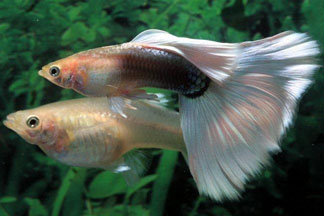Guppy fish, an effective tool in fighting dengue
MANILA, Philippines: Larvae-eating guppy fish can help combat the
spread of dengue, a mosquito-borne illness, giving rise to hundreds of
thousands of severe cases including 20,000 deaths worldwide every year,
according to a trial study by the Governments of Cambodia and the Lao
People's Democratic Republic (Lao PDR) with the support of the Asian
Development Bank (ADB) and the World Health Organisation (WHO).
 "This is a low-cost, year-round, safe way of reducing the spread of
dengue in which the whole community can participate," said ADB health
specialist Gerard Servais. "It offers a viable alternative to using
chemicals and can reduce the scale of costly emergency response
activities to contain epidemics." "This is a low-cost, year-round, safe way of reducing the spread of
dengue in which the whole community can participate," said ADB health
specialist Gerard Servais. "It offers a viable alternative to using
chemicals and can reduce the scale of costly emergency response
activities to contain epidemics."
The community-based project, conducted in two districts in Cambodia
and the Lao PDR from 2009 to 2011, resulted in a sharp decline in
mosquito larvae in water storage tanks after the tiny fish were
introduced. Guppies eat larvae that grow into mosquitoes, which in turn
bite humans and transmit dengue.
Dengue causes severe joint and muscle pain, headache, high fever and
rashes and is fatal in a small proportion of cases, particularly if not
diagnosed and treated early.
Outbreaks of the illness not only affect families with sudden health
care costs and loss of income for adults put out of work, but also
impact health services, businesses and tourism, straining government
budgets due to unplanned spending on large-scale emergency response
measures. There is still no vaccine or specific medicine to treat this
viral disease.
Around 2.5 billion people worldwide are at risk of contracting
dengue, more than 70% of whom live in Asia and the Pacific.
The threat of exposure to dengue-carrying mosquitoes is rising with
uncontrolled urbanisation and a surge in the use of non- biodegradable
packaging, which can act as a water reservoir for dengue mosquito
breeding.
Dengue is spread by a specific mosquito that breeds readily in
standing water, such as found in storage containers, flower pots and
discarded tyres. The guppies are particularly effective in these
settings. Convincing communities to accept fish in their water
containers was a key element of the project. |

